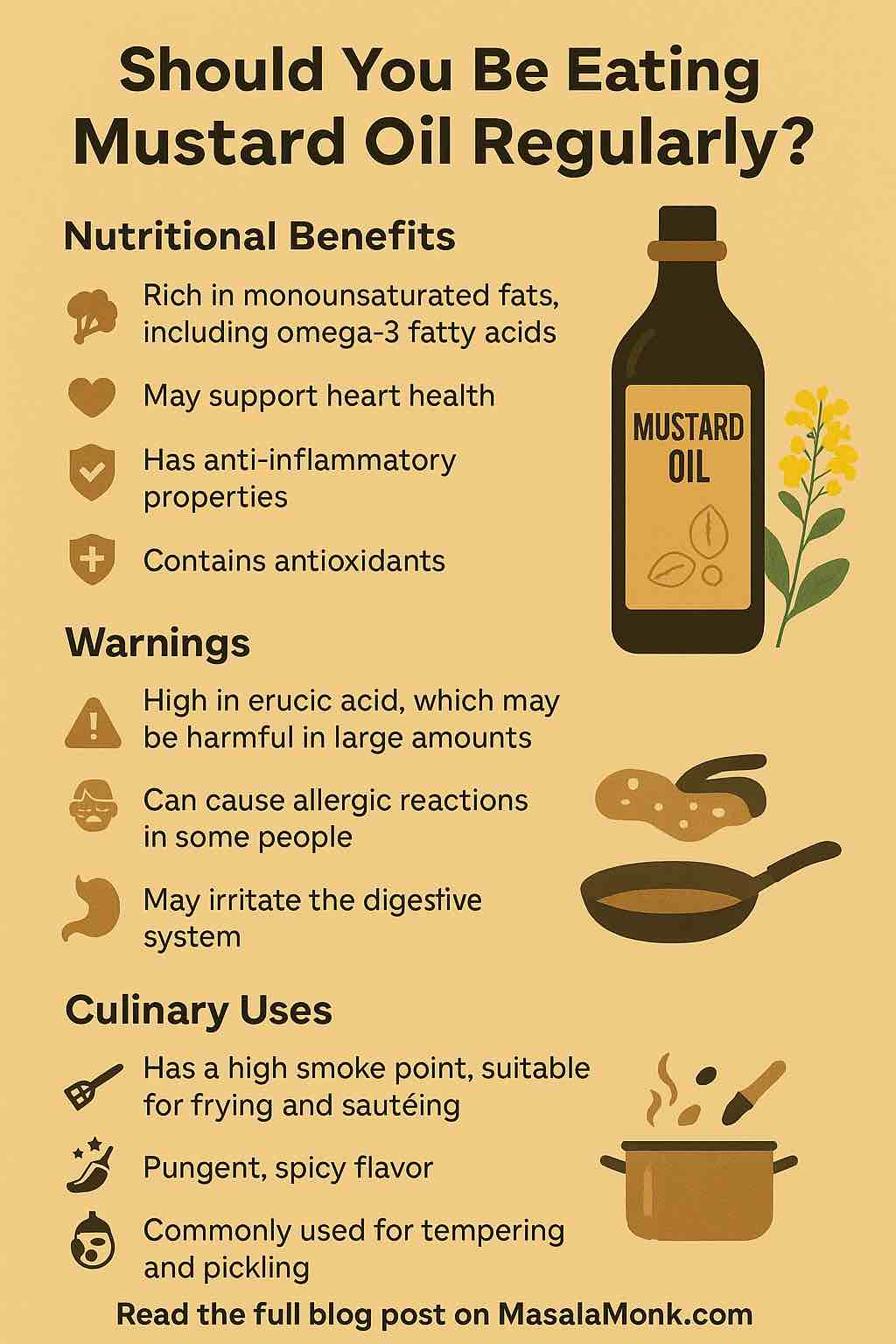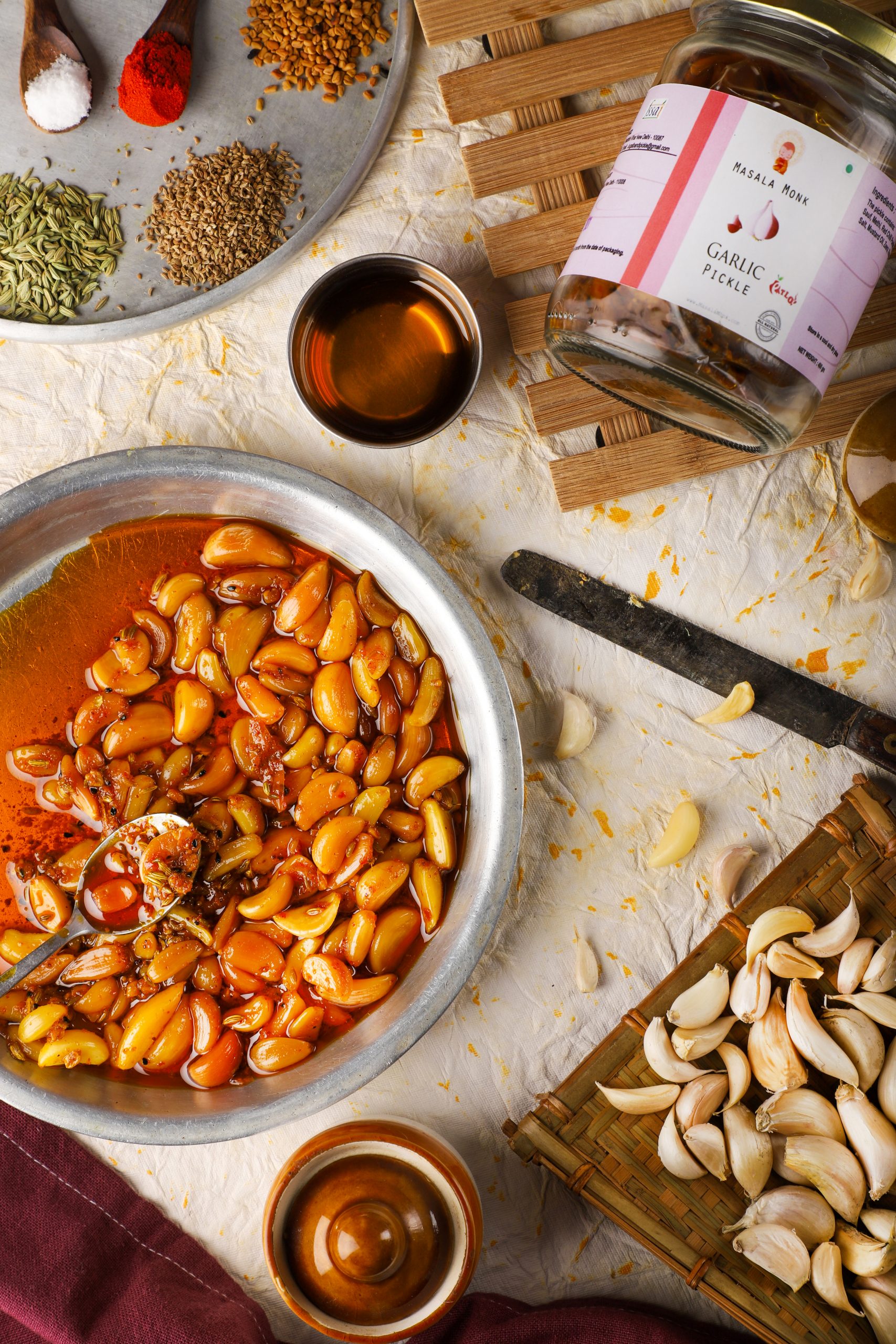
Mustard oil has long been a staple in many South Asian kitchens, prized for its pungent aroma, bold flavor, and versatile cooking properties. But beyond its culinary charm, mustard oil has sparked debates about its health effects, safety, and whether it deserves a permanent spot in your pantry. So, should you be eating mustard oil regularly? Let’s dive deep into the science, benefits, potential risks, and practical cooking tips to help you make an informed choice.
What Is Mustard Oil?
Mustard oil is extracted from the seeds of the mustard plant, known scientifically as Brassica juncea. It has a distinctive pungent aroma and a spicy, slightly bitter flavor. Traditionally used in Indian, Bangladeshi, and Nepalese cooking, mustard oil is valued not only for frying and sautéing but also for pickling and even therapeutic uses in massage and home remedies.
Nutritional Profile: What’s Inside Mustard Oil?
Mustard oil stands out for its unique composition of fats and micronutrients:
- Monounsaturated Fatty Acids (MUFAs): About 60% of mustard oil’s fats are MUFAs, predominantly oleic acid, which is known to support heart health by helping to lower LDL (“bad”) cholesterol.
- Polyunsaturated Fatty Acids (PUFAs): Contains omega-3 fatty acids like alpha-linolenic acid (ALA), which have anti-inflammatory benefits.
- Saturated Fat: Roughly 12%, lower than many other cooking oils.
- Vitamin E and Antioxidants: Mustard oil provides vitamin E, a powerful antioxidant that helps protect cells from damage caused by free radicals.
- Selenium: A trace mineral that supports immune function and has antioxidant properties.
This blend of fats and nutrients means mustard oil has potential health benefits, but its safety and consumption require a closer look.
Health Benefits of Mustard Oil
1. Heart Health
Thanks to its high content of monounsaturated fats and omega-3 fatty acids, mustard oil can support cardiovascular health. MUFAs help reduce LDL cholesterol levels and raise HDL (“good”) cholesterol, which may decrease the risk of heart disease. Moreover, omega-3s contribute to lowering inflammation and improving blood vessel function.
However, research is mixed on mustard oil’s impact on heart health, partly because it contains erucic acid (more on this below). Some studies suggest moderate use is beneficial, while excessive consumption could pose risks.
2. Anti-Inflammatory and Antioxidant Properties
Mustard oil contains natural antioxidants like vitamin E and selenium, which help neutralize harmful free radicals in the body. This antioxidant action can reduce oxidative stress, a factor involved in aging and many chronic diseases.
Additionally, the omega-3s and other compounds in mustard oil may help reduce inflammation, which is linked to conditions like arthritis, asthma, and some autoimmune diseases.
3. Respiratory Benefits
Traditionally, mustard oil has been used in natural remedies for respiratory issues. Its strong aroma acts as a natural decongestant, helping to clear blocked nasal passages. Applying warm mustard oil mixed with garlic on the chest is a common folk remedy to ease congestion and coughs.
4. Skin and Hair Health (Bonus)
While this post focuses on dietary use, it’s worth noting that mustard oil is also used topically for skin and hair care, thanks to its antimicrobial and nourishing properties.
The Controversy: Erucic Acid and Health Concerns
What Is Erucic Acid?
Erucic acid is a type of monounsaturated omega-9 fatty acid found in high amounts in unrefined mustard oil. Historically, animal studies linked high erucic acid intake to heart lesions, raising concerns about its safety in humans.
How Much Is Too Much?
The exact risk level for humans remains unclear, and modern refining processes reduce erucic acid content significantly. Many countries regulate mustard oil and recommend limits on erucic acid consumption.
Potential Risks
- Heart Health: Excessive consumption of high-erucic acid mustard oil may contribute to heart muscle damage.
- Pregnancy: High doses during pregnancy are not advised due to potential risks to fetal development.
- Allergic Reactions: Mustard oil can cause skin irritation and allergic responses in sensitive individuals.
- Digestive Issues: Some people report stomach irritation, heartburn, or bloating when consuming mustard oil.
Regulatory Status
In the United States, mustard oil is labeled “for external use only” due to erucic acid concerns. However, in South Asia, where it’s widely used as cooking oil, consumption is common, and refined versions are considered safer.
Should You Eat Mustard Oil Regularly?
The answer depends on multiple factors: your health status, cooking habits, and where you live.
- Moderation Is Key: Using mustard oil occasionally or in moderate amounts as part of a varied diet is unlikely to cause harm for most people.
- Choose Refined Oil: Refined mustard oil has reduced erucic acid and is generally safer for cooking.
- Consider Your Health: If you have heart issues, allergies, or are pregnant, consult your doctor before regular use.
- Balance Your Fats: Use a mix of oils rich in omega-3s and MUFAs, such as olive, canola, and flaxseed oils, alongside mustard oil.
How to Use Mustard Oil in Cooking
1. High-Heat Cooking
Mustard oil has a high smoke point (~250°C or 482°F), making it excellent for frying, deep-frying, and sautéing. This means it remains stable and does not break down easily under heat, preserving nutrients and flavor.
2. Flavor Enhancer
Its strong, pungent flavor is perfect for adding depth to dishes like curries, stir-fries, pickles, and marinades. A small amount can impart a rich aroma and spice that elevates simple meals.
3. Tempering and Finishing
Use mustard oil for tempering spices (known as tadka) in Indian cuisine, where hot oil is poured over cumin seeds, mustard seeds, or dried chilies to release flavors.
4. Storage Tips
Store mustard oil in a cool, dark place, preferably in a sealed container, to maintain freshness and prevent rancidity.
Final Thoughts
Mustard oil is a flavorful, nutrient-rich cooking oil with potential health benefits and some risks to be aware of. While concerns about erucic acid are valid, moderate use of refined mustard oil is generally safe for most people and can add unique taste and nutrition to your cooking.
If you decide to include mustard oil in your diet:
- Use it thoughtfully and sparingly.
- Combine with other healthy fats.
- Choose refined versions if possible.
- Be attentive to any allergic reactions or digestive discomfort.
Ultimately, mustard oil can be a valuable addition to your kitchen — when used with knowledge and care.
Have you tried cooking with mustard oil? What’s your favorite dish? Let me know in the comments below!
FAQs About Mustard Oil
1. Is mustard oil safe for cooking?
Yes, mustard oil is safe for cooking, especially when using refined versions with lower erucic acid. Use it in moderation and avoid excessive consumption.
2. What are the health benefits of mustard oil?
Mustard oil provides heart-healthy monounsaturated fats, omega-3 fatty acids, antioxidants like vitamin E, and anti-inflammatory properties that may benefit cardiovascular and respiratory health.
3. What is erucic acid, and why is it a concern?
Erucic acid is a fatty acid found in high amounts in unrefined mustard oil. Excessive intake has been linked to heart damage in animal studies, which is why consumption should be moderate and refined oils preferred.
4. Can mustard oil cause allergies?
Yes, some people may experience allergic reactions such as skin irritation, rashes, or respiratory issues. It’s advisable to do a patch test before topical use and monitor for any digestive discomfort if consumed.
5. Is mustard oil good for heart health?
Mustard oil contains beneficial fats that may support heart health, but due to erucic acid concerns, it should be consumed in moderation and balanced with other healthy oils.
6. Can pregnant women use mustard oil?
Pregnant women should consult their healthcare provider before using mustard oil, as high erucic acid intake may pose risks during pregnancy.
7. How does mustard oil taste and how is it used in cooking?
Mustard oil has a pungent, spicy flavor and is widely used for frying, sautéing, pickling, and tempering spices in South Asian cuisine.
8. What is the smoke point of mustard oil?
Mustard oil has a high smoke point of around 250°C (482°F), making it ideal for high-heat cooking like frying.
9. How should mustard oil be stored?
Store mustard oil in a cool, dark place in an airtight container to maintain freshness and prevent it from becoming rancid.
10. Can mustard oil be used topically?
Yes, mustard oil is traditionally used for massage and skin care, but always perform a patch test first to check for allergic reactions.













